Gary Barwin's Blog: serif of nottingblog, page 6
September 25, 2022
Language2 or the square root of minus language.
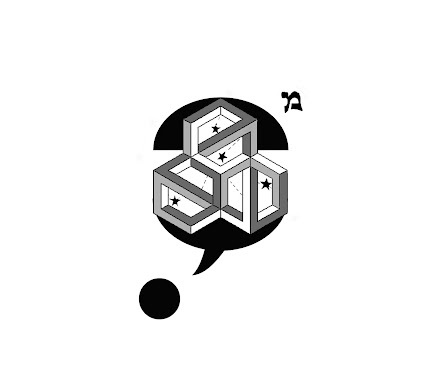
[…]
They write—the world is made of tiny particles. Waves. Strings. Various forces which are things and things which are forces, secret wires which make the visible, entangled and strange. And another kind of tangle: ideas that are signs and signs that are ideas.
In Jewish thought, the letters of the alefbet (the Hebrew alphabet) predated the creation of the world. In fact, the world was made out of these letters, these strange scrapings on the brainscape of the infinite. And each Hebrew letter is a story, a symbolic arrangement of its parts. This little hadron went to market, and this one tore the previous universe a new one.
Inside the brain, there’s the shape of a little person. The homunculus of one’s greater self. The shape of hands, face, one’s mother, father, night, thunderstorm. The shape of each letter. The homunculus is a kind of letter. A sigil inside the head. The brain doesn’t only contain a representation of the script (and the script) of one’s conceptual story, the brain is these things. It is made of them. Its convolutions and thickets take the form of what they represent. Language does this. […]
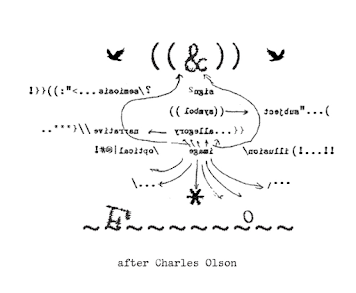
But whose language? How can we [re]write [re]writing, ensure we’re not snared, entangled. Uh, power structures, epistemological colonization. Yeah, capitalism (I’m not just talking the beginning of proper nouns) and ideology. […] Don’t take me for an ideogram. A hippograph.
But back to basics. An A. A W. An ampersand. The Hebrew letter Shin (ש). Ellipses, those no-see-um markers which represent what isn’t there. […] If one wants to edit out the ellipses, one needs to put them back in in order to signal that they are gone.
A door is a door but it is also the Hebrew letter Dalet (ד). Why am I telling you this? I don’t even speak or write Hebrew. But that’s why. As a child, I sat in synagogue and marvelled at the books filled with knurls that were letters. Scrolls filled with them, lung-sized rectangles of close-inked text on sewn-together pages of parchment; letters, crowned exoskeletons both etymological and entomological. Scrolls crowned in literal silver crowns, wrapped in velvet, kept in a gold-lit ark. […] The sounds of chanting, the cantor with a silver pointer in the shape of a pointing finger. And the marvel that these letterforms, these mouthshapes, were unintelligible to me except as script or music. The calligraphic maze. An amazement. The shapes of letters as tactile, aesthetic, their meaning not in their meaning but in their form, the inky music of looking, the region of the brain, evolving with these letters, the calligraphic region, the frontal majuscule, cerebral longhand, the amygdalet (ד), the homunculus not holding a pen but made of language, of letters. […]
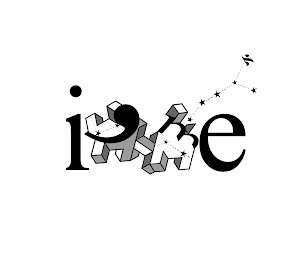
Language is pataphysical. The imaginary solution to real problems. The real distillation of imagined reality.
Here’s a parenthesis. ). Here’s another. (. Together )(. What lies outside except everything. All language. The set of everything that can be written. And which cannot. Now what is outside of the spoken. ”…“
Oh that’s a language. That’s a language-and-a-half.
Language2 or the square root of minus language.
Wittgenstein says, “What we cannot speak about we must not pass over in silence.” But that’s where it gets interesting. It’s where we learn about speaking, about language. […] What if we speak about what we cannot speak? If we write what we cannot write? If we remain where we let ourselves almost fall but catch ourselves. If we see how far language will take us. If we’re taken in, or out. Language, the a priori trickster. If […] had wanted a connection between reality and language, […]’d have made reality out of language, and given us the world to communicate with.
[…]
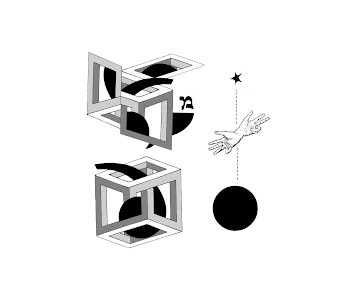
This essay will be in my new book of visual poetry, Portal (Potential Press, 2022) and the Hebrew images from The Wild and Unfathomable Always (Xexoxial Editions).
September 4, 2022
The Most Charming Creatures -- New Book! -- and a note on the Brainsnail of Translation.
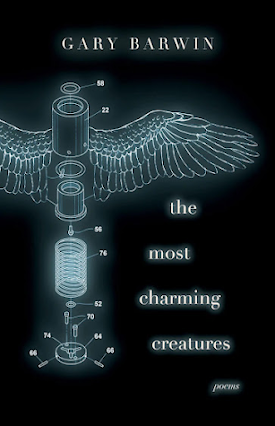
My new poetry book is out!
Very grateful to the essential rob mclennan for this first review of my new book. If a book is published in a forest and it isn’t reviewed, is it even there? rob makes sure so many books are there, are heard.
He quotes the poem Brainsnail from a suite of Lucretius "translations" in its entirety. These translations are more transcreations, reimagings rehabitating some aspect of the orginal. Haroldo de Campos spoke about giving the poem a blood transfusion. There's an interesting article on Cannibal Translation here.
I only knew the term transcreation from its use by contemporary poets, but here's a longer history.
My technique/process often involves using Google translate (moving the poem through many different languages), sometimes N+7 (I use the automated Spoonbill N+7 which gives 14 versions, each one more distant from the original.) I almost always then revise the poem freely. The idea for me is that these initial transformational processes generate material for me to consider, material outside the greater limitations of my immediate imagination, but that then enable me to listen carefully and open up another part of my imagination, listening for interesting or engaging moments, resonances, possibilities in the generated text. Something of the source material inheres (certainly formal aspects, but other things too, and I am aware of my source and its context--this has an influence on my revision and writing, too.) There's a frisson between the original and my version, inviting the reader to consider the connections or relation to the source. Also imagine the process and what it might mean. How did we get here from there? In what way does these new version retain aspects of the old, in what way is it diametrically opposed or divurgent?
I like the portmanteau "Brainsnail." In what way is a brain like a snail? It can be slow. It leaves a trail. Something in the coils of both. Maybe brain is to snail as a translated poem is to its original. Or is it the snail of the translator moving through the brain of the original?
Brainsnail
after Lucretius I.936-943
just as eyebrows by the brain are raised
we touch the rim around the world
with the sweet, golden liquor of thought
it tricks us
and works as far as the lips
so that meanwhile we drink down the raw
world’s juice
the intent is deceptive not malevolent
and we try to lift trees like eyebrows
squeeze history’s tectonics with our mind
make things with an I Dream of Jeannie nod
this possessive, this past, this gerund, this goat
this cow, echidna, ghost, carfentanil
pancakes, poems, dusklight
who is this “we” we make drink the world?
not birds but windspeed
what Francis Ponge writes:
words. decency. our humanism
*
I thought I'd demonstrate the process with a new "transcreation." Here are the original Lucretius, the Google translated version and then my edits to hopefully make a new and interesting poem.
1. Original translation of a section of
On the Nature of Things by Lucretius
Substance is Eternal
This terror, then, this darkness of the mind,
Not sunrise with its flaring spokes of light,
Nor glittering arrows of morning can disperse,
But only Nature's aspect and her law,
Which, teaching us, hath this exordium:
Nothing from nothing ever yet was born.
Fear holds dominion over mortality
Only because, seeing in land and sky
So much the cause whereof no wise they know,
Men think Divinities are working there.
Meantime, when once we know from nothing still
Nothing can be create, we shall divine
More clearly what we seek: those elements
From which alone all things created are,
And how accomplished by no tool of Gods.
Suppose all sprang from all things: any kind
Might take its origin from any thing,
No fixed seed required. Men from the sea
Might rise, and from the land the scaly breed,
And, fowl full fledged come bursting from the sky;
The horned cattle, the herds and all the wild
Would haunt with varying offspring tilth and waste;
Nor would the same fruits keep their olden trees,
But each might grow from any stock or limb
By chance and change. Indeed, and were there not
For each its procreant atoms, could things have
Each its unalterable mother old?
2. Google translation.
Running “original” through multiple unrelated languages.
The heart is permanent.
This fear, the darkness of his heart,
It's not a sunny day,
And the flower that burns at night does not break,
But that is only part of the law of nature.
This is what the exordium tells us;
They don't do anything from scratch.
Fear conquers death
Because it can be seen in the earth and the sky
They did not know the source of his wisdom,
People believe that gods work there.
At the same time, they are crazy
We were created from nothing, and from above
What we get: Name
He did everything.
It is not something created by God.
Imagine everything from nothing: diversity
Whatever may come,
Mature fruits are not needed. The sailor
It can stand, and tomorrow the hair will leave the ground.
Birds fly in the air.
Cows, cows, and all wild animals
These generations consume a lot of food;
Old trees do not bear the same fruit,
However, each can grow out of different or special things.
Shock and change. Actually, no
For each particle there are atoms that come into it.
A mother who does not change her age?
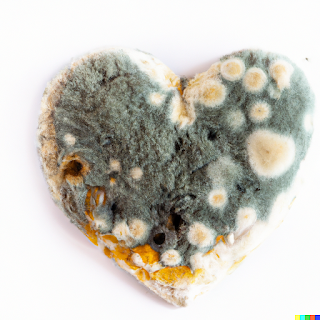
3. FINAL
Editing the Google translated version,
freely modifying and moving lines around.
The Heart is Permanent
the flower that burns at night does not break
they don't do anything from scratch
“fear conquers death”
it can be seen in earth and sky
“it's not a sunny day”
ships burst into flame despite rain
it’s what they tell us
and what we get: names
imagine everything from nothing
now a digression to speak of oceans
sailor, tomorrow you leave the ground
birds fly in the air
old trees do not bear the same fruit
shock and change
actually, no
we only spoke of boats
and sailors
for each thing there is
a mother who does not age
yet people believe we were created from nothing
and Neruda wonders why the waves ask
the same questions we ask them
same for flowers, sailors,
fire and your heart
itself a wave, flower
a glittering arrow
August 28, 2022
Alternatives to Harmony: TRIOLET with CAGE refrain
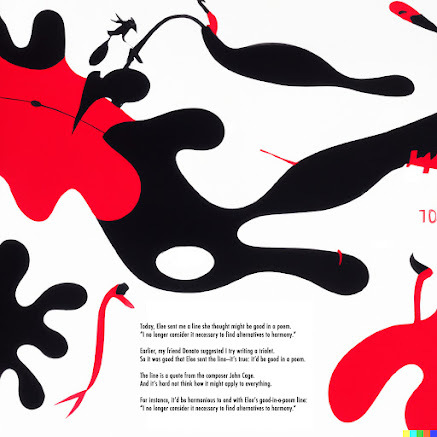
Triolet
Today, Elee sent me a line she thought might be good in a poem.
“I no longer consider it necessary to find alternatives to harmony.”
Earlier, my friend Donato suggested I try writing a triolet.
So it was good that Elee sent the line—it’s true: it’d be good in a poem.
The line is a quote from the composer John Cage.
And it’s hard not think how it might apply to everything.
For instance, it’d be harmonious to end with Elee’s good-in-a-poem line:
“I no longer consider it necessary to find alternatives to harmony.”
August 17, 2022
UNBOXING VIDEO for my LATEST POETRY BOOK, THE MOST CHARMING CREATURES
My newest poetry book, THE MOST CHARMING CREATURES is just out with ECW Press. I received a box of them in the mail and here is my unboxing video, filled with poise, gravitas and with a nod to personal hygiene because those three things are the essentials of poetry. Poetry is the best poise, gravitas and personal hygiene in the best order, as Auden once said.
August 15, 2022
Thursday
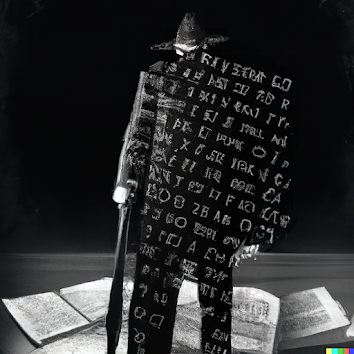
Thursday.
April 19, 2022. 11:35 am. A pile of calendars, datebooks and diaries heaped in the middle of the yard. A red gasoline tank. Gas poured. A match lit. The huge, the huge conflagration of everything that has happened. Also, because represented in the burning heap were days, weeks, months and years that were yet to happen, they too are gone, turned to fire, heat, ash, crackling. My face flushed. Clouds puffy in the sky. The sound of traffic on a nearby road. Angels. Trampolines. Dust.
August 14, 2022
EVERYTHING ALWAYS IS POSSIBLE NOW
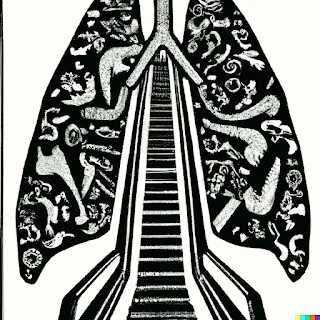
EVERYTHING ALWAYS IS POSSIBLE NOW
I stand and watch people
at the mall. When they step
off the escalator I say
“That escalated quickly.”
Yesterday, I made notes in
a green notebook
realized I didn’t know where
my organs were. Someone stabbing me
might have to guess.
_________________
NOTE
Of course this is written thinking about the recent attack on Salman Rushdie. In addition to the horror of this violence against a writer and against our right to speak our truth to power, to critique, investigate, reconsider, remix, explore, reinvent, inquire, I am also thinking about how the present world seems to be fracturing before our very eyes, even as we know that it has, with the except of climate change, always been like this in one way or another. I feel like this is a series of essay questions in a high school exam: Is the present really worse than the past? In what way? Is there any point comparing? How are we feeling at this moment? What now? What IS possible?
August 7, 2022
SWELL
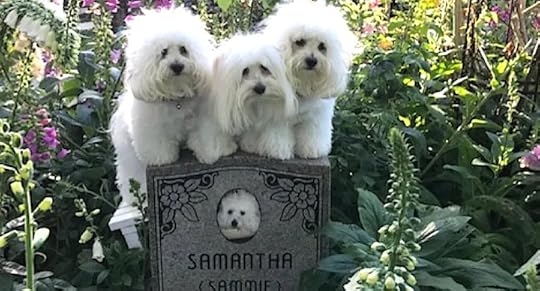 Babs' cloned dogs
Babs' cloned dogs
SWELL
wearing a shirt made of wasps
white anglo saxon protestants
and trousers made of raw meat in
this doggy world
my underwear ironic because
isn’t all underwear ironic?
[tighty whitey/
dramatic irony]
don’t Jewish you were
a moon of flutes
bluebirds fill air
with bluebirds
what do Jews in raw meat/dog world
images represent?
Catholic hegemony in Medieval Europe
the Enlightenment a mint
Barbra Streisand phoned last night
me
tarmac slick as seal skin
night black as tarmac
tarmac like caves
face with closed holes
Babs got her dog cloned
replaced my heart with a froot roll-up
why? because it wasn’t sticky enough and
I wanted to mention heart in this poem
because of feelings.
the poem is a clone all around me
barking
and buzzing didn’t Rilke say
you must clone the world?
I forgot because airways
July 30, 2022
VICTORY
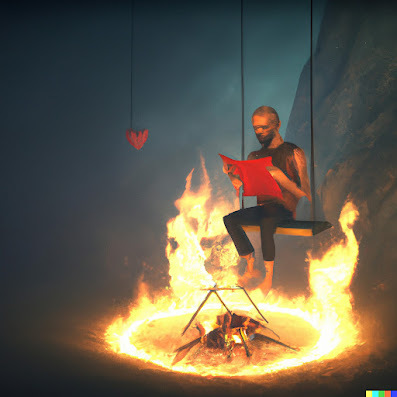
my first heart attack occurs when
I, a 12-year Jewish girl with pants big
as the occupied territories
sew a parachute for a Gulf War vet
out of appropriated pemmican but leave holes ignored by the UN
and the guy has to rely on CanLit tropes all the way down.
My second heart attack occurs when we steal roses
from the Gillers and I drive a getaway car into unceded
Old Colony Road and flip four houses. Harm occurs to many POC
(where? your choice) because I say so in this award-winning poem.
In a 7-11, I buy a Slurpee from a kidnapped monkey and in the basement
make my face red with grief. I’m not kidding. My lover sculpts
replica Civil War bullets to use as dental records.
My third heart attack occurs when a Scout leader
metaphorically knots woggles with his perfect mind and
high above the city, a cancer-surviving trapeze artist goes down on himself
in mid-air and catches fire. My fourth heart attack occurs
when my Survival includes surviving me. It’s the last one because
I rip my heart out, stick it on a gold platter
like the noggin of John the Baptist and win.
__________
over on Twitter, Alicia Elliott posted some prompts from an old creative writing class given by Joseph Boyden at the Banff Centre for the Arts. I tried to use as many of them as I could in this poem.
The Pope's Visit
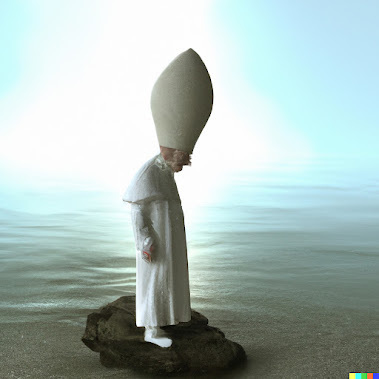
THE POPE’S VISIT
The Pope came to visit. We rented a giant U-Haul and drove to Barrie. We’d found a used fence for free on Kijiji. We went to pick it up. The Pope and I loaded it and we brought it back to my house in Hamilton. Later we will get fence posts but the Pope will be back in Rome so I’ll have to do it all myself.
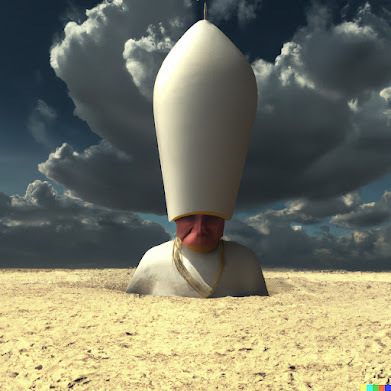
DOCTRINE
Today was a beach day. We packed cars, brought sandwiches, watermelon and towels. We all arrived at the same time and it sure was busy. The smell of sunscreen reminded everyone of childhood. It was a beautiful day. Someone had brought the Pope. We were bored and so we buried him in sand. Everyone forgot where he was! Finally, the sun went down and we all went home and went to sleep. The Pope was happier in the sand, soft, damp, and cool. One day, he hoped, he’d be discovered.
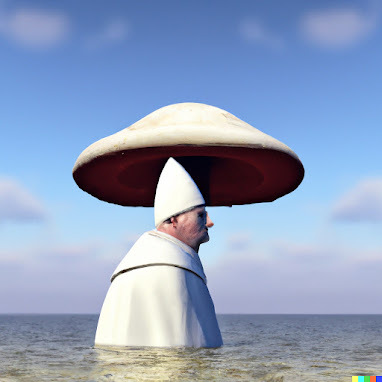
LEGS DAY WITH THE POPE
It was legs day and so I did Bulgarian Split Squats, Romanian Deadlifts, Hip Thrusts, Goblet Squats, Glute Hamstring Curls and Barbell Squats. When I went to lift the barbell, I saw the last guy hadn’t wiped it down. Sorry, the Pope said. Under his cassock, his legs were Roman columns. Doric, Ionic, or Corinthian. The Pope looked up at the ceiling. I think he saw something.
July 22, 2022
The Gallery and Tom Thomson Lungs
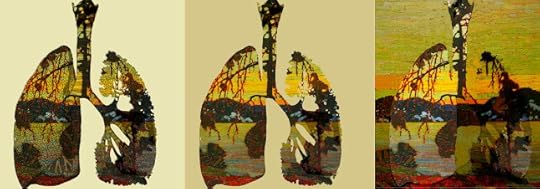 An image I made using a Tom Thomson image blended with lungs
An image I made using a Tom Thomson image blended with lungs
I've been collaborating with Swiss composer and artist Tobias Reber. One of the strains of his work is to generate AI images which are an intigruing blend of the organic in nonorganic spaces. His work has a dreamlike intensity, if your dreams were filled with mold, lichen, moss, art galleries and wooden doors. He asked the question about aestheticizing catastrophe and so I began to speculate about that in this poem.
The Gallery
It’s remarkable how things melt.
Consider the design of a deer.
The world is our gallery.
We’ve made a world of tiny Mona Lisas and our brains are galleries.
Adorno said, “During climate collapse to make a gallery is barbaric.”
Or, we’ve made a world of tiny brains and the world is Mona Lisa.
Climate collapse is a gallery.
No wonder Mona Lisa is smiling.
Consider coral reefs.
It’s not so much Climate Collapse but a sparkling apocalypse.
Every time an iceberg is born, another passerine loses its wings.
I’m beginning to think of our brains as icebergs.
My heart was and always will be a songbird, no matter how broken.
Let me sing a slow goodbye.



